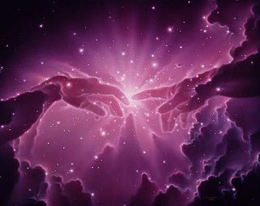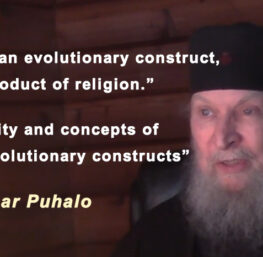 10/24/2010 – Msgr. Charles Pope –
10/24/2010 – Msgr. Charles Pope –
Sobriety about Evolutionary Theory – It is common to experience a rather simplistic notion among Catholics that the Theory of Evolution can be reconciled easily with the Biblical accounts and with our faith. Many will say something like this: “I have no problem with God setting things up so that we started as one-celled organisms and slowly evolved into being human beings. God could do this and perhaps the Genesis account is just simplifying evolution and telling us the same thing as what Evolution does.”
There are elements of the truth in this sort of a statement. Surely God could have set things up to evolve and directed the process so that human beings evolved and then, at some time he gave us souls. God could have done that.
The problem with the statement above is less theological than scientific because there is a word in that sentence that is “obnoxious” to evolutionary theory: “God.” The fact is that most Catholics who speak like this over-simplify evolutionary theory and hold a version of it that most Evolutionary Theorists do not hold. They accept the Theory of Evolution uncritically.
But, at the heart of evolutionary theory are the concepts of natural selection and genetic mutation. Notice the word “natural” and notice the word “mutation.” Generally speaking, evolutionary theory sees these processes as random, (though influenced by the environment). It sees them as chance mutations that happen to survive because they confer some benefit. But the process is natural, random and not directed by any outside intelligence with a design or purpose in mind.
Mutations in DNA are random, and in natural selection, the environment determines the probability of reproductive success. The end products of natural selection are organisms that are adapted to their present environments. Natural selection does not involve progress towards an ultimate goal. Evolution does not necessarily strive for more advanced, more intelligent, or more sophisticated life forms. Organisms are merely the outcome of variations that succeed or fail, dependent upon the environmental conditions at the time.[1]
Now what this means is that God is excluded as a cause by evolutionary theory. It would be fine if evolutionists (as natural scientists) were either silent on the question of God. Or, perhaps if they simply stated that things may be acted upon by an outside force or intelligence but that is beyond the scope of their discipline. But that is not what is being said by most proponents of evolutionary theory. They are saying that biodiversity results MERELY from natural selection and random (i.e. non intended or non-purposeful) genetic mutations. They are saying that observable effects of biodiversity are wholly caused by something natural, random and without any ultimate goal or plan.
But a Catholic cannot accept all of this. Even if a Catholic wants to accept that things have evolved in some way (whether through macro or microevolution) a Catholic cannot say that this process is simply random, chance, blind, or with no purpose. We believe that God alone created all things, and that he sustains all things. Neither do we confess some sort of “deist” God who merely started things off and then lets them take their own course. Rather, God sustains and carries out every detail.
The Book of Genesis depicts God as being personally involved in every stage of creation. “In the beginning, God created the heavens and the Earth” (Genesis 1:1). The text says further ”God made the wild animals, each, according to their kinds (Gen 1:25). In other words, God specifically created each animal and person that is in an intentional way. The text of Genesis, while not scientific, states a truth that we cannot set aside: That God created (and sustains) all that we see. That what is, cannot MERELY be explained (as most evolutionists state) by blind, random natural selection. The Genesis text is clear to state that God alone creates and in doing so he is present at every stage, is personal, purposeful and acts with intelligence and goal in mind. He creates everything according to its kind.
This is our faith and we cannot simply accept evolutionary theory without some distinctions. Evolutionary theory proposes itself as a complete and closed explanation for the biodiversity of this planet. Catholics ought to be sober about who and what we are dealing with here. This theory sets aside important things we believe about creation and God, which are described in Genesis and believed by the Church. The theory sets aside God. Things are not the result of a rational, orderly and directed processes, they result from a process that is merely random, blind and tending to no purpose or end. We cannot accept such a theory merely on these terms. If we accept aspects of the theory, such as that things gradually evolved, we have to carefully distinguish this from mainstream evolutionary theory. But a simple, uncritical acceptance of evolutionary theory is for a Catholic untenable.
This does not mean that Catholics therefore run to the creationist school of thought. There are important insights of science in the matter of creation and the material world that Catholics are free to accept and wise to accept. The Catechism stakes out a middle ground wherein a Catholic may be able to accept certain aspects of evolutionary theory in terms of secondary causality. But this must always be balanced with a deep reverence for God as the first cause of all that is:
God is the sovereign master of his plan. But to carry it out he also makes use of his creatures’ co-operation. This use is not a sign of weakness, but rather a token of almighty God’s greatness and goodness. For God grants his creatures not only their existence, but also the dignity of acting on their own, of being causes and principles for each other, and thus of co-operating in the accomplishment of his plan…..The truth that God is at work in all the actions of his creatures is inseparable from faith in God the Creator. God is the first cause who operates in and through secondary causes: “For God is at work in you, both to will and to work for his good pleasure.” Far from diminishing the creature’s dignity, this truth enhances it. Drawn from nothingness by God’s power, wisdom and goodness, it can do nothing if it is cut off from its origin, for “without a Creator the creature vanishes.” Still less can a creature attain its ultimate end without the help of God’s grace. (CCC 306-309).
Hence, a Catholic ought to be very careful to avoid an uncritical acceptance of the Theory of Evolution. An old maxim comes to mind: Seldom Affirm, never deny, always distinguish. Not a bad approach when it comes to this great debate about Evolution, the Bible and faith.



